Wolfgang Lund, Swedish-born French Umpire, is now amongst the very best umpires in the world. But his life has not been a smooth path – a cancer left him with no hope until the light came again after a tough 2-year fight when he could finally sit on an umpire’s chair again. He shares his incredible story with Michaela Bencova, his colleague and Badzine Columnist for her monthly column “The Official’s Whistle”.
Photos: Badmintonphoto
BADZINE: Wolfgang, you are a BWF certificated umpire from France but you are not really French, aren´t you? Can you tell us your family story to explain that you are truly an “international” umpire?
Wolfgang Lund: I have a rather messy and complicated background! I was born in the Schleswig-Holstein region in the northern part of Germany close to the Danish border. In a small town called Itzehoe, located 60 km northwest of Hamburg.
My mother is German with Hungarian roots (her great grand-father was some kind of gypsy on the Hungarian puszta) and my father a pure Danish Viking. We all moved to the south of Sweden when I was only 8 months old. I was brought up, spent my whole childhood and a part of my adult life in Sweden.
The first time I discovered Paris was during an all-around Europe trip for a month in my early twenties. I immediately fell in love with the town and knew deep down in myself that it was here, in the “City of Lights – La ville lumière” that I wanted to settle down.
But first I wanted to finish off my studies in sociology and history of art at the university in Gothenburg. It took me three more years before I actually decided to moved to Paris in the mid-eighties. I’ve now been living here for more than 25 years.
Swedish is my mother tongue. But due to my parents I also speak and understand Danish and German. And of course English and French. Very practical for an umpire when you want to detect funny insults and rude remarks from players! And sometimes it can be very surprising for some of them…! But as an umpire I’m a 100% pure product “made in France”.
BZI: How did you become an umpire? When and why?
WL: A couple of years after my arrival in the French capital, I started playing badminton on a regular basis. Of course I had already played some badminton in Sweden during my school-days, but I didn’t start training and learning to play badminton seriously until I came to Paris.
I became a big fan of this sport and wanted to know all the different aspects of it (techniques, tactics, rules, laws…) On the request from the French Badminton Federation I translated into French (together with a French friend) a Swedish instruction book about badminton written by Lars Sologub and Terje Dag Osthassel (at that time Lars Sologub was the head coach for the French National Badminton team). No serious book in badminton techniques and tactics was yet available in French, so there was an urgent need for a referential book on this matter. It almost took us three years of translation before the book was finally published in 1992. Shortly afterward, I started line-judging during the French Open, in 1993 or 1994. It was a great and enjoyable experience. To know that your call (at this period the umpire couldn’t overrule a line judge) could either make a player win or lose a point (or his/her temper!) or even a match filled me with a big sense of responsibility and a desire to be as fair and precise as possible – qualities that later on would become useful and necessary as an umpire. I think what really fired me off was when Lars Sologub at an occasion during the French Open told me that I was an excellent line-judge.
“Why not try to become an umpire?” he suggested. He thought I could become a good one.
BZI: Can you decribe your way up amongst the top BWF Certificated umpires? What is the system of upgrading in France?
WL: I registered for an umpire course for beginners at the end of October 1996. At that time I didn’t have the slightest hint that I was going to become an international umpire a couple of years later. But I felt at ease almost at once, understood the basics of umpiring quickly, studied the rules really hard and the terminology. I practised umpiring during some local tournaments and passed my first exam (local grade) in the beginning of 1997. The practical part of the assessment went very smoothly, but the oral exam could have turned into a fiasco! I can still recall how nervous and tense I felt when the examinator asked the mandatory questions. I managed to give a correct answer to almost all of them, except for one about who was supposed to serve and receive in a men’s doubles match when the score was 8-9 second server in the final game (at that time we had the old scoring system with 15 points and second server). My mind went totally blank, I couldn’t make sense of anything, and I didn’t understand the question, even though the assessor repeated it over and over again.
I was convinced that I had failed, stood up, shook hands with the assessor, thanked him politely and muttered something like “Sorry, but umpiring is not for me.” He insisted upon that I think it over one more time and then try to answer the question. But before asking me the question again he advised me to leave and go out of the hall, take a walk and then come back – which I did – and much to my own surprise I came up with the correct answer! Today I’m still grateful to this assessor for being so patient and understanding. Otherwise my career of umpiring would have come to an end before it had even started. His attitude toward me is something I nowadays keep in mind when I‘m assessing nervous candidates myself.
After obtaining my local grade, everything went very quickly. I did a lot of umpiring, watched and observed other, more experienced umpires, studied the rules over and over again and was very unsatisfied with myself each time I noticed (or someone else did!) that my terminology wasn’t exactly as written in the status book. I passed the regional grade without any difficulties a couple of months later and in September the same year I was invited to a course for umpires wishing to be upgraded to national level. The course and assessment was run by four impressive persons in France: Isabelle Jobard, Ernest Robinson, François Fourel and Evelyne Maton, all of them international umpires for many years.
I passed the exam, gained a lot of confidence from it and therefore began to tell myself that I maybe could become an international umpire.
Two years later (1999) I officiated during my very first French Open, was very impressed by the whole set-up; the presence of foreign umpires coming from all over Europe, all the line-judges, the organization, the briefings, all the different national flags being displayed on the walls in the big hall, the players and court officials’ names being printed on nameplates and announced loudly via a microphone. And everything was in English! I soon found out that I enjoyed umpiring in English much more than in French. The English vocabulary just seemed to fit in your mouth more naturally and smoothly than the French.
The same year I also umpired during another international tournament in Toulouse, le Volant d’Or in the south of France. But I consider the real start of my international career as an umpire to be the 1st Italian Open, held in Marsala on Sicily in 1999.
Originally, another French umpire (I think it was Evelyne Maton) was supposed to attend this event but a couple of circumstances played in my favour. She became seriously ill, couldn’t travel to Palermo, had a non-refundable and non-changeable flight ticket from Paris…
As I was available at that time, lived in Paris, spoke English fluently and had already experienced two international tournaments held in France, I was asked by the French Badminton Federation to go to Italy. Chance of a lifetime!
Isabelle Jobard was the referee for the event and I shared room with Ronny de Voos (an BWF umpire, or at that time an IBF umpire) from Belgium. I observed his umpiring skills very carefully, we discussed umpiring a lot and he became an inspirational model to me.
Torsten Berg, then president of the EBU (European Badminton Union, now known as BE, Badminton Europe) was also present at the event. I was introduced to him by Isabelle and he told me that he had been watching some of my matches as an umpire, that he liked my way of umpiring and that I should go abroad more often in order to gain more experience from international tournaments. He actually sent a fax to the French Badminton Federation (at that time there was no Internet, no email, no mobile phones) urging them to send me out to international events in Europe.
From then on everything just rolled on: Swedish Open twice (no wonder, it was my home country!), Slovakia Open, Dutch Open, German Open, Dutch Junior, Bulgarian International…
In 2001, I participated in a training course organized by the EBU in order to prepare and select future candidates for European accredited or certificated umpires.
I was selected to be assessed for the EBU-grade during the European Individual and Team Championships 2002 held in Malmö, Sweden. Back on home soil again, it felt reassuring. This time I shared room with a fellow French umpire, Gilles Cavert, who already was a certificated EBU-umpire.
He was of great support to me during the whole week. I finally passed the exam at the end of the week and had now in my turn too become a certficated EBU-umpire.
The following year I was given the privilege to umpire during the Denmark Open. Which was very funny, because I understood perfectly well all the bad words uttered from the Danish players when things didn’t go quite their way. Since I was supposed to be French some of them were very surprised indeed! Among them Camilla Martin who sometimes could be very expressive!
Then came March 2004 and I was sent to the legendary All England in Birmingham, the big tournament…
Everything about it was impressive. The Indoor Arena, the lightning, the crowd, the black curtains which all together created a prestigious atmosphere. I enjoyed every minute of it and at the same time it felt unreal that I was actually a part of it. I couldn’t believe my eyes (and ears) when I was asked to officiate as a service-judge during the mixed doubles final! This was, after all, my very first participation in the “Old England”, the world’s most famous tournament.
Next step became the BWF accreditation assessment during the World Junior Championships (team and individual event) in Vancouver, Candada, in 2004. My first trip ever outside Europe.
It was maybe the toughest exam I’ve ever been through. Almost 10 days of supervised umpiring in a cold ice-hockey arena. The badminton courts were only protected from the underlying ice-rink by a thin wooden floor, which resulted in netposts, weights and courts rapidly being covered with frost.
Regulary, linesmen had to go on court, not to wipe away perspiration from the players but to vigorously mop it and warm it up in order to avoid formations of ice! It was a memorable stay and I flew back home to Paris with my new BWF uniform in my luggage. During our assessment, all officiating umpires had to wear the green BWF shirt (even the candidates) and if you failed you had to give it back at the end of the competition!
With the BWF accreditation in pocket, I had reached the peak in my umpire career (or at least I thought so) because of an age-limit rule stipulating that you could only become a certificated umpire if you were 45 years old maximum when you first became an accredited umpire. And I was 47 in 2004! But fortunately the rule was repealed some years later. In August 2007, I was invited to umpire for the first time at the World Championships, held in Kuala Lumpur. It was also the first time in my life that I was travelling to Asia.
Both had a deep impact upon me.
For health reasons, I had to wait until August 2009 before I was able and fit enough to attend the World Championships in Hyderabad, India, where I finally was labelled as a BWF Certificated Umpire. I had now reached the highest level of international umpiring. But I almost didn’t manage to get that far and I had to struggle in order to get there…
BZI: All Badzine readers know very well about the story of Czech player Petr Koukal who just recovered from cancer. Unfortunately this disease can strike anywhere, anytime. Do you want to share your experience?
WL: Two weeks after returning from the World Championships in Malaysia, I got a high fever attack that kept me in bed for almost 10 days. Doctors thought I had been struck by a severe malaria and after a week of heavy treatment the fever disappeared. But during the next couple of months, those fever attacks came back over and over again. I got weaker and weaker after each attack, lost weight and appetite, all kinds of test and blood exams were taken and in October I was (wrongly) diagnosed with tuberculosis. A new heavy and long treatment with lots of side effects was introduced. Since I was absolutely convinced that I was going to be cured, I strictly followed all the doctors’ instructions. But I didn’t get any better. The fever attacks continued, I continued to become weaker, kept on losing weight and appetite and slowly even my hope. After more than 3 months without any results, I begged the medical staff to stop the treatment. Then I only weighed 59 kg (I’m a tall man, 190 cm!), all my muscles had melted away and I couldn’t stand on my feet anymore. All my hope of getting better had slowly but surely faded away, I had no energy left to keep on resisting or fighting against my illness and I finally ended up totally accepting it and the thought of death and dying. Memories from different periods in my life ran through my mind. I felt grateful that life had allowed me to turn 50 that year, having allowed me to experience and achieve so many things.
I was ready to die and it wasn’t frightening at all. In fact I felt amazingly peaceful and calm. No more struggle and strife. No more hoping, wanting, expecting or wishing something else from life or the world. I’d had a miraculous glimpse of it and it was more than I could have wished for.
Nevertheless, the doctors decided to run new blood tests, new biopsies, new X-rays and this time all results clearly indicated that I was suffering from a cancer, Hodgkin’s Lymphoma, in its final stage. Lymphoma is a cancer in the lymphatic cells of the immune system. These malignant cells often originate in lymph nodes, presenting as an enlargement of the node (a tumor). The cancer had slowly been developing in my body for probably several years and some of my inner organs (liver and pancreas) had also started to show signs of getting affected by it.
When the doctors announced the cancer to me, I barely stared up at them from my bed and thought “So what? I had already been told that I had malaria and then tuberculosis so why not a cancer to top it all off?!”
Instantly they wanted to start a treatment with powerful chemicals and as much as I was concerned, they could do whatever they wanted with my body. I had already abandoned it with my mind. I entered a half-year-long chemo treatment with no expectations whatsoever of becoming better, much less cured.
Before the first administration of my chemotherapy, a catheter was operated in under my skin on my chest. Later bags containing various celldrugs were hooked up to a portable stand and it took about 5-6 hours before all the drugs had been pumped in to my bloodstream through the cath. This treatment was repeated every fortnight for 6 months.
I slept a lot during my first two chemo sessions (sometimes 20 hours per day!), hardly ate anything because of nausea and vomiting, continued to weaken and lose weight. I was even more convinced than before that the treatment was useless. And frankly I didn’t bother, I was ready to die.
Then, after my third session, something amazing and completely unexpected happened inside me. As if a small ray of light suddenly had arisen or awakened from deep within my body.
Something that didn’t come from the outside but originated from the inside. Something at the same time extremely fragile and powerful, a profound state of peaceful joy. Difficult to explain in words, but from that moment on, I strongly knew that I was reconnected to the energy flow of life. It just felt as a miracle to be alive, to breathe, to see, to hear, to smell… simply just to be. I had reached a crucial turning point. From then on, everything I did or felt got transformed and transpierced by it. I lost my hair, my sensory nerves in my feet, hands and lips got damaged by the toxic drugs, which led to a loss of sensation and balance problems (almost three years after the end of the chemo the nerves in my feet still haven’t been completely restored.)
But in spite of all this, it couldn’t alter the inner state of aliveness I perceived. It helped me through the following months of the chemo treatments, I slowly got back my appetite even if I still suffered from nausea, I gained more and more weight, I seriously and happily began to do exercises with my physiotherapist in order to rebuild my muscles, find my balance, stand up and start to walk on the ground and even going up and down stairs. I still remember how happy and enthusiastic I felt when for the first time I was able to walk up the 10 stairs in the staircase between the 6th and 7th floor in the hospital! A feeling and a memory I nowadays recall whenever I, or somebody else, is complaining or getting upset about whatever it might be. My bonds to friends and family deepened and grew stronger. Working colleagues and some of my umpire friends showed great support. I simply felt grateful being a part of life itself. Now, more than three years later, I’ve fully recovered and my cancer is now considered as cured. I’ve picked up my full-time job at my daily newspapers for kids, I’m playing and umpiring badminton again. As if nothing had happened.
But I know that this period has been a milestone in my life because it enabled me to open up and touch a spiritual dimension to life. So nothing will ever be the same again. I feel more respect for all living things, no matter in what shape or form it manifests itself. And what is bringing me closer to life is the fact that we will all die. We all have this in common, no matter if we like or dislike somebody, no matter if they are rich or poor, a man or a woman… What differentiates us is our different ways of dealing with it. Most people don’t want to think of death and dying, are denying it or not accepting it. Most are scared. I now know that the more you deny it the more it comes as a shock when it arrives (and it inevitably will arrive to all of us, to everything). This is not possible?! This should not happen. But it happens all the time. This fundamental condition brings me closer to people.
BZI: You did win that battle so what are your plans for the future? In badminton, in your private life?
WL: As long as my body and mind allows it, I will continue to work, travel, play badminton and umpire. And also take more care of my ageing parents and people around me.
BZI: In the last few weeks, there has been a big discussion about new BWF clothing regulation – mandatory skirts for female players on Grand Prix and higher tournaments. What is your opinion about that? What do you think is still possible or missing to make badminton more popular and atractive sport?
WL: Women have been treated more equally with men in badminton lately (same prize-money, same scoring system for everybody). So why suddenly put emphasis on the differences between sexes by imposing a special rule for how women should dress and present themselves? My opinion is that you shouldn’t oblige or impose on female players to wear skirts if they don’t feel comfortable with it (for whatever reason it might be).
What will enhance the presentation and the attractiveness for the sport is the variety of players’ styles, clothing, characters and personalities. It’s up to the players to decide how they wish to express it.
Why not skip most of the restrictions concerning advertisements on players outfits? That will surely bring in more sponsors, money and creativity. As long as you can clearly see the name of the player and country on the back. Besides, have you noticed that in tennis, they players don’t even have to show their names!
Anyway, the rule will apparently be implemented from the 1st of June and it will be interesting to see how it will work.
BZI: And from umpiring – what can make you really nervous on court? Is there anything what you don’t like – i.e. behaviour of players, cameras, bad line judges etc.?
WL: Loads of things! Microphones that work and suddenly don’t and then work again! Uncomfortable umpire chairs. Sometimes you don’t know how to get up in them or down from them in an elegant way. Heavy rain and leaking roofs. When an intense match is stretched to a final game and you realise that that you haven’t been to the toilet for a while! Photographers waving from one court side to another in order to capture the expression of a winners face when both teams are all-level at 21-21.
But what really makes me uneasy is when I haven’t managed to establish a real contact with the players and the court officials once I’m on court. You only have a couple of minutes to do this, when you welcome and greet the players on the court and when you proceed with the toss (sometimes you’ve already met the players and the line judges at the meeting point before marching on court). During this short lapse of time you have to communicate to the players that you respect them, that they can trust you, that you will be and stay calm and fair and be there for them when the going gets though, when frustration and anger creeps into the game, when they get upset about dubious line calls, when they get upset about their opponent, when they get upset about themselves, when they get upset by the umpire! The foundation of my umpiring is based upon this first impression. And upon the fact that I have a constant eye contact with the service-judge and the line judges. If anything of this is missing, I pray to God that this match will end as fast as possible.
BZI: Who is your favourite player and who you prefer not to have on court?
WL: I actually like a lot of the top players in all categories – Lin Dan, Lee Chong Wei, Cai Yun, Fu Haifeng, Wang Yihan, Peter Gade, Hendra Setiawan, Saina Nehwal, Zhao Yunlei… just to mention some of them. They are very impressive and professional, have worked hard and know how to win a match. But also how to handle losing one. This has made them mentally strong and this strength emanates from them when they are on court.
In general, I appreciate and enjoy umpiring players from Asia, especially China, Indonesia and Japan.
Some players are very challenging to deal with, arguing and protesting against decisions made (or not made) by the umpire, service-judge or line judges. Most of them are coming from good English-speaking nations. Which is not surprising because English is the official language used in badminton. I’m sure that if, for instance, Chinese were the official language, we would have seen a lot more Chinese or Asian players arguing and complaining!
BZI: So far, your best match or best tournament what you really enjoyed and you will never forget? You can even share with us your negative reactions if any.
WL: My most nervous match I’ve ever umpired was the women’s doubles final during the All England 2009. It was my first All England final and I didn’t want to make any mistakes whatsoever. I still don’t know how I managed to get through that match keeping my calm. I’ve must have been on automatic pilot from the start until the end!
I will never forget the warm crowd in Istora Stadium during the Djarum Indonesia Open 2009 and how it felt to be on the umpire’s chair in a boiling ocean of 15,000 Indonesian fans chanting and celebrating every point made by Taufik against LCW. Sometimes my eyes got blurry from joyful tears I shed. Simply because having the immense privilege to be a part of it all. I also like the French enthusiastic and keen connoisseur audience in Paris.
The greatest hospitality experience ever were during the China Open 2010 and the Korea Open 2009/2011.
BZI: There is a age limit for umpires for officiating at BWF events 55 years and BE events 60 years. You are getting closer and closer. Do you feel like retiring? What do you think about age limit generally? Still it doesn’t mean finishing umpiring completely so do you plan to continue or you will find another hobby?
WL: No, I don’t feel like retiring yet. So I will happily continue for 5-6 years more. Share my experience, push other French umpires to reach the top level. And slowly get used to the fact that everything in life will and has an end, with or without age limits.
Thank you very much and see you soon on court.
![OFFICIAL’S WHISTLE – Wolfgang Lund – Multilingual survivor Wolfgang Lund, Swedish-born French Umpire, is now amongst the very best umpires in the world. But his life has not been a smooth path – a cancer left him with […]](https://www.badzine.net/wp-content/uploads/Newsflash-thumbnail.png)
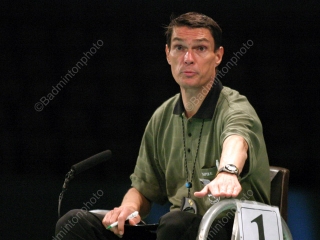
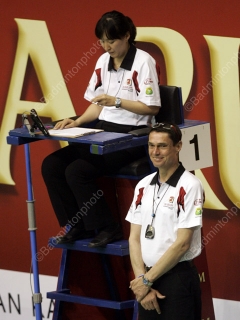
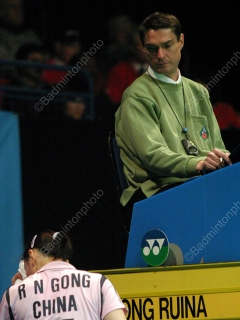
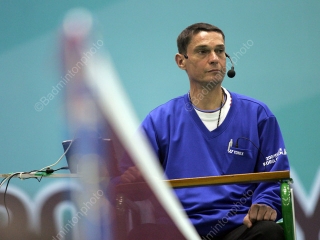
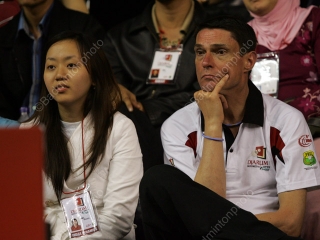
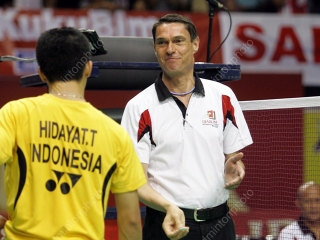
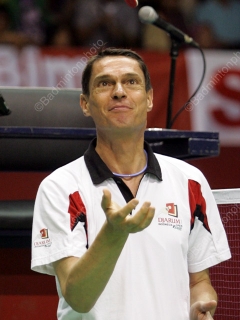
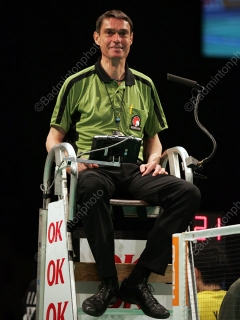
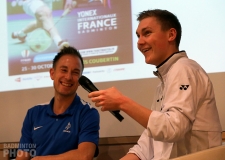
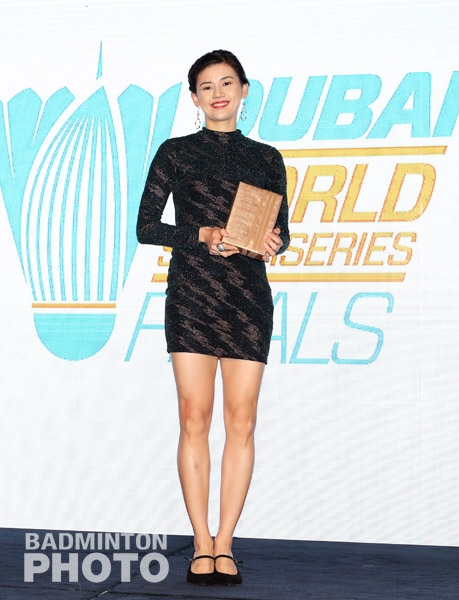

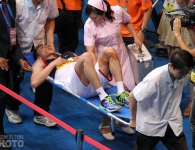
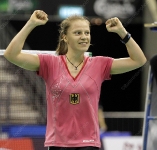
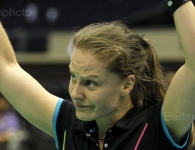
Leave a Reply